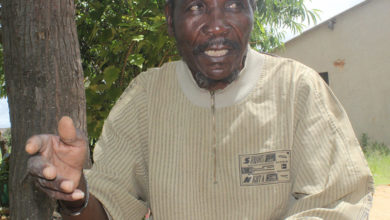JEYS MARABINI ZIM’S TOUGH AS NAILS JAZZ GURU
The Man Who Produces World Class Music From A Backyard Studio

JEYS MARABINI ZIM’S TOUGH AS NAILS JAZZ GURU

The Man Who Produces World Class Music From A Backyard Studio
By Kamangeni Phiri 28/2/2023
Veteran afro-jazz maestro and philanthropist, Jeys Marabini, is a self-driven man who does not know how to quit.
The adage, “Out of life’s school of war—what doesn’t kill me, makes me stronger,” first said by German philosopher Friedrich Nietzsche in 1888, could have been coined for him.
Marabini has endured protracted spells of illness, poor remuneration, walking long distances for shows and, at times, awful show attendance figures over the majority of his three-decade musical career, but he has persevered.
The vastly talented musician mastered the art of making the most out of his adversities over the years. Today, he creates world-class music that appeals to a diverse range of fans around the world.
“The music I am doing is original,” he recently told Nash online TV recently, “It is not bubblegum music. It can last 40, 50 or even a 100 years. I always make sure most of my songs are accompanied by quality videos to help push them.”
Marabini records his works at his own studio that he setup in 2009 at his Nkulumane residence in Bulawayo. The makeshift backyard studio doubles up as rehearsal space for the jazz crooner and his band, Kuzekulunge.
Despite his busy schedule, the philanthropic musician finds time to partake in community projects. He promotes and supports upcoming musicians, both young and old.
Marabini has groomed and moulded many aspiring artistes at his Nkulumane studio, turning them into professionals. The youths are taught how to play different instruments that include the guitar and drums.
“We have a music school here where we support a lot of budding musicians,” he stated. “We teach kids who come in knowing nothing about music but leave as skilled musicians.”
Among Marabini’s many products is a guy who is a backing vocalist in his band who has since recorded his own album and can now play the guitar. He also mentored an artiste who is now teaching music at a college in Harare while another of his products is now producing Casper Nyovest’s music in South Africa.
“We are producing a lot of artistes who are contributing to the development of our music industry in Zimbabwe and the region.
Hudson Simbarashe, a seasoned jazz performer and guitarist, is also a member of my band. He is a notable recording artist in his own right,” he said.
But it is Marabini’s enthusiasm for working with emerging talent that stands out.
He has collaborated with a Bulawayo-based Zimdancehall artiste in the past and his latest offering Xola, features a number of upcoming musicians such as Amaqaqa, Thandie Dlana, Mqabelo, and Khabo. Most of them are not yet known.
“Working with upcoming artists helps keep the legacy expanding so that it does not end with us.
I also like working with Zimdancehall artistes, collaborating with them in their projects. They are doing very well as musicians. However, I don’t just do collaborations for the sake of it. The song must be good first, with a clean message and the other artiste should be willing to do a video so that we push the song, make it more visible on the market,” said Marabini.
Jeys also works with the Zimbabwe Prisons and Correctional Services. He visits prisons where he motivates prisoners, giving them hope. He also engages communities, encouraging them to give prisoners another chance once they rejoin society after serving time.
“That’s what we do as musicians. We help build social bridges,” he said.
Jeys Marabini’s official birth name is Majahawodwa Ndlovu and he was born in Filabusi, Matabeleland South, in 1971. He is the seventh child in a family of nine boys. Ndlovu enrolled for his grade one in 1980 at the local Dekezi Primary before moving to the neighbouring Dekezi Secondary for his high school education. He grew up in Filabusi as a member of the Brethren in Christ Church, where he discovered his aptitude for music while still in secondary school. He started singing from an early age with his brothers at home and in church.
But it was in 1991 at the age of 20 that Marabini decided to become a professional musician when he formed an a cappella musical group called Comforting Brothers just after completing form four. The group was based in our village.
After completing O’ level Jeys and the Comforting Brothers went around performing at local halls, clinics and schools in Matabeleland South region. School kids would pay 60 cents per head to watch the imbube group perform.
Soon after, the Comforting Brothers took their imbube music outside of Matabeleland South in quest of new markets. Their first destination was Gutu area in Masvingo. The group used public buses like Shue-shine and Munenzwa for transport.
At times Jeys and his crew would sleep at Mpandawana Growth point terminus in Gutu while on other occasions they would sleep under parked buses or inside them.
“We would walk long distances of about 20 to 25km, either hunting for shows or performing in schools. At times we would take turns carrying our stage attire; overalls, gumboots and shields, it was heavy stuff. There was no transport in between the schools. I have slept in classrooms, under the trees, trenches and five star hotels because of my music. I have slept everywhere. It is such memories that make me strong. Even my rural background has helped in toughening me. You have to be strong to survive in this industry,” he said.
Comforting Brothers later changed its name to Imbizo when it relocated to Bulawayo seeking better exposure and bigger audiences.
They would perform outside the Revenue Hall for free on Saturdays. Members of the public would throw coins on the pavement to show their appreciation. The revenue hall performances gave the group exposure that culminated in their getting hired to perform at weddings and other functions.
Imbizo performed in the city of Bulawayo from 1992 until end of 1994 when Majahawodwa Ndlovu was invited to join Sunduza by the late Simon Banda. Sunduza is an imbube group that is also based in Bulawayo. Jeys joined the group in 1995 and they immediately went on a six month tour of India and the United Kingdom.
After a series of successful world tours, Marabini came back home to take a well-deserved break from music. He quit the group in 1998 and formed his 10-member band called Kozekulunge in 2002.
His first project, Emarabini, released in the same year the band was formed, was a huge success.
It propelled him to stardom.
The album was so popular that wherever he went people started calling him Marabini.
“Most people do not know that my name is not Marabini initially. I used to call myself Jeys and Kozekulunge but because of the popularity of that album I got myself a stage name.
And my music is not marabi. On that album I had a song by that name which was about the flamboyant dressing that one would see in the 60s and 70s (emarabini). The video for that song won us many awards and that’s something that I’ve always been grateful for in my career,” he told local weekly, Sunday News.
Marabini went on to win many more awards with his subsequent projects that were accompanied by quality low budget videos. His art has taken him to Austria, United Kingdom, South Africa, India, Canada and more but to the jazz maestro, home remains the best.
“People out there in Europe and the United States love our music. They love African music done in our local languages. I, however, believe it is best if you are appreciated more by your own people as a musician. People who don’t listen to their own music are killing their culture. Music is a vehicle for carrying our culture forward,” said Marabini who now has 10 albums to his name.
He wants Zimbabweans to archive the works of all musicians for new generations’ benefit. Marabini said late artistes like Solomon Skhuza, Don Gumbo, Leonard Dembo, Fanyana Dube and Tongai Moyo have produced music that remain relevant even today, decades after they died.
“Dembo, for example, died close to 30 years ago but his music sounds just as fresh. Sadly, when we travel abroad we see books and documents on Zimbabwe and African music but strangely these books are not written by Africans. This is why our history is distorted. We should learn to document our own history,” said Marabini.
Majahawodwa Ndlovu is married to Fatima and they have three kids.
One of his lowest points in life was probably in 2021 when his haemorrhoids problem got worse. Marabini has been struggling with haemorrhoids for the best part of the last decade. A scan that he had last year revealed that he also had an inflamed spleen.
The illness drained the artiste financially as he was away from his primary source of income – the stage – for some time.
The highlight of his life was meeting President Emmerson Mnangagwa at the State House in Bulawayo last year.
Jeys said he was humbled when he met President Mnangagwa who also met part of his ballooning medical bill.
Marabini has some advice for upcoming artistes: persevere, be patient and have staying power in the face of challenges.
A musician, he said, should always be there for his fans in good times and bad times.
“If you get into music expecting to make money you will be disappointed. One must do music because he or she has the passion. Whether you make money or not, you should always be there for your fans. Sometimes you do it because you have made a name as a musician, a brand that people believe in,” said Marabini.
The band’s name, Kuzekulunge, (It shall be well) is very telling.
Marabini often highlights in many of his interviews the several issues that are not right with Zimbabwe’s arts. These include the lack of support and appreciation by local fans, the uneven playing field that artists from Matabeleland region have to contend with compared to their Harare-based colleagues as well as poor remuneration.
“We need to keep talking about the things that drove my senior brother, Lovemore Majaivana, away from the music scene, the things that affect artistes from this region. Music fans and corporate should not support musicians based on regions. Support us based on merit. I am a Zimbabwean musician and I need to be supported by Zimbabweans, not only by people from Matabeleland. And music promoters, can you promote every musician? Give everyone a chance please,” said Marabini.
For real, Kuzekulunge, (it shall be well).



